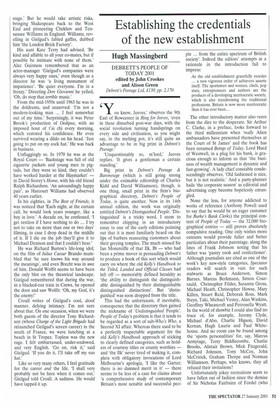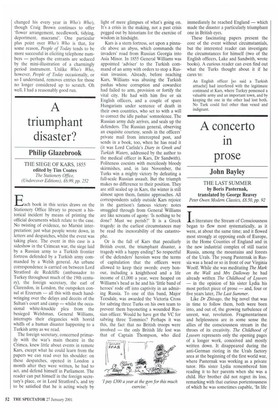Establishing the credentials of the new establishment
Hugh Massingberd
DEBRETT'S PEOPLE OF TODAY 2001 edited by John Crookes and Alison Green Debrett's Peerage Ltd, £130, pp. 2,170 you know, Jeeves,' observes the 9th Earl of Rowcester in Ring for Jeeves, 'even in these disturbed post-war days, with the social revolution turning handsprings on every side and civilisation, as you might say, in the melting pot, it's still quite an advantage to be in big print in Debrett's Peerage.'
'Unquestionably so, m'lord,' Jeeves replies. 'It gives a gentleman a certain standing.'
Big print in Debrett's Peerage & Baronetage (which is still going strong under the estimable editorship of Charles Kidd and David Williamson), though, is one thing, small print in the firm's biographical directory, Debrett's People of Today, is quite another. Now in its 14th annual edition, the work was originally entitled Debrett's Distinguished People. 'Distinguished' is a tricky word. I seem to remember chipping in an introductory essay to one of the early editions pointing out that it is most familiarly heard on the lips of barbers reassuring customers about their greying temples. The much missed Sir Ian Moncreiffe of that Ilk, Bt — who had been a prime mover in persuading Debrett's to produce a book of this sort which would carry on where the old Kelly's Handbook to the Titled, Landed and Official Classes had left off — memorably defined heraldry as 'the ability to distinguish the distinguishable distinguished by their distinguishable distinguished distinctions'. But 'distinguished' was soon dropped from the title.
This had the unfortunate, if inevitable, consequence that the directory then gained the nickname of 'Undistinguished People'. People of Today's problem is that it tends to be regarded as a sort of sub-Who's Who, a Second XI affair. Whereas there used to be a perfectly respectable argument for the old Kelly's Handbook approach of sticking to clearly defined categories, such as holders of courtesy titles or county worthies — and 'the Ilk' never tired of making it, complete with obligatory invocations of Lord Melbourne's apologia, 'I like the Garter; there is no damned merit in it' — there seems to be less of a case for claims about 'a comprehensive study of contemporary Britain's most notable and successful peo
ple ... from the entire spectrum of British society'. Indeed the editors' attempts at a rationale in the introduction fail to impress:
As the old establishment gracefully recedes ... a new vigorous order of achievers asserts itself, The sportsmen and women, chefs, pop stars, entrepreneurs and authors are the products of a developing meritocratic society, which is also transforming the traditional professions. Britain is now more meritocratic than it has ever been...
The other introductory matter also veers from the dire to the desperate. Sir Arthur C. Clarke, in a preface, looks forward to the third millennium when 'really Alien ambassadors have presented themselves at the Court of St James' and the book has been renamed Beings of Today. Lord Hurd of Westwell, in a plug for his bank, is gracious enough to inform us that 'the business of wealth management is dynamic and fast-growing'. A lady chief constable condescendingly observes, 'Old fashioned is nice, but it is not realistic.' And a party-planner hails 'the corporate season' as editorial and advertising copy become hopelessly entangled.
None the less, for anyone addicted to works of reference (Anthony Powell used to say that he would be an eager customer for Burke's Bank Clerks) the principal content of People of Today — the 32,000 biographical entries — still proves absolutely compulsive reading. One only wishes more entrants would provide fuller and better particulars about their parentage, along the lines of Frank Johnson noting that his father was 'pastry cook and confectioner'. Although journalists are cited as one of the work's key new-style categories, Spectator readers will search in vain for such stalwarts as Bruce Anderson, Simon Barnes, Marcus Berkmann, Simon Courtauld, Christopher Fildes, Susanna Gross, Michael Heath, Christopher Howse, Mary Killen, Stuart Reid, Deborah Ross, Mark Steyn, Taki, Michael Vestey, Alan Watkins, Geoffrey Wheatcroft and Petronella Wyatt. In the world of showbiz I could also find no trace of, for example, Jeremy Clyde, Michael d'Abo, Charlie Higson, David Kernan, Hugh Laurie and Paul Whitehouse. And no room can be found among the 'sports personalities' for, say, Marcus Armytage, Terry Biddlecombe, Charlie Brooks, Alistair Brown, Mick Fitzgerald, Richard Johnson, Tony McCoy, John McCririck, Graham Thorpe and Norman Williamson. Perhaps, who knows, they all refused their invitations?
Unfortunately jokey recreations seem to have fallen out of fashion since the demise of Sir Nicholas Fairbairn of Fordel (who changed his every year in Who's Who), though Craig Brown continues to offer 'flower arrangement, needlework, tidying, deportment, macrame'. One particular plus point over Who's Who is that, for some reason, People of Today tends to be more successful in eliciting telephone numbers — perhaps the entrants are seduced by the mini-illustration of a charmingly period instrument. Unlike Who's Who, however, People of Today occasionally, or so I understand, removes entries for those no longer considered up to scratch. Oh well, I had a reasonably good run.























































































 Previous page
Previous page